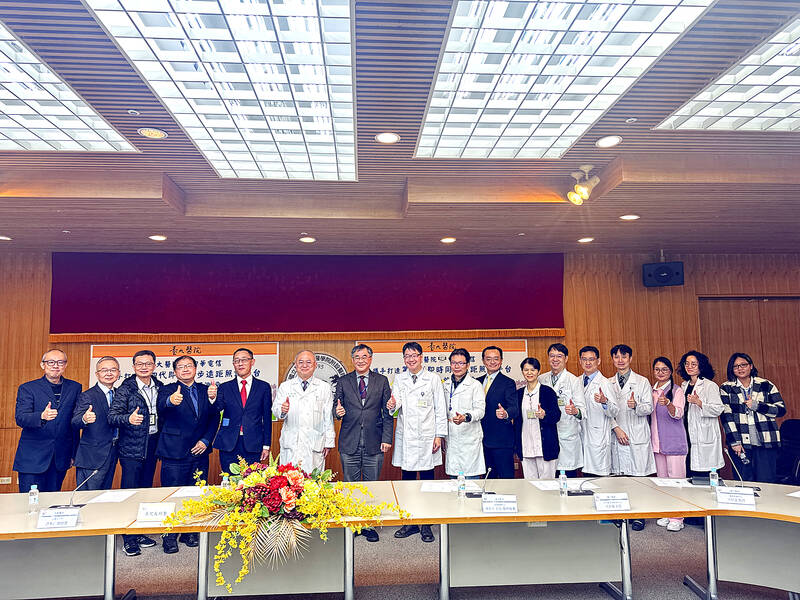National Taiwan University Hospital (NTUH) on Thursday presented its newly developed telecare system that uses artificial intelligence (AI) to predict the occurrence of patient-related emergency events by analyzing text conversations between patients and their live-in caregivers.
The “Intelligent Voice Emergency Prediction System of the Fourth-Generation Real-Time Synchronous Telehealth Care Platform” developed by NTUH and Chunghwa Telecom won the “21st National Innovation Award-Clinical Innovation Award” in November last year.
At a news conference, Ho Yi-lwun (何奕倫), director of the Department of Internal Medicine and Telecare Center at NTUH, said the system converts conversations between patients and caregivers into text, and could analyze keywords in conversations, such as blood pressure and other physiological data, for earlier predictions for emergency treatment, thereby reducing unnecessary complications in patient care.

Photo: Chiu Chih-jou, Taipei Times
Taking people with acute myocardial infarction as an example, Ho said if intervention occurs within the golden six hours for treatment, there is a chance occluded blood vessels could be recanalized.
The intelligent voice emergency prediction system could accurately identify people with emergency needs, distinguish between high and low-risk patients, and allow those with greatest need to receive necessary treatment quicker, he added.
This system would not only help reduce emergency room visit rates, but also the length of hospital stays and the risk of death, due to immediate medical responses, Ho added.
Hung Chi-sheng (洪啟盛), a doctor from NTUH’s Telehealth Center, said that since its establishment in August 2009, the Telecare Center has handled 540,000 phone calls and cared for more than 7,000 patients.
It cooperated with Chunghwa Telecom to introduce the telecom’s multi-language, medical speech recognition technology and conduct AI model training, which could recognize speech in Mandarin, English and Hoklo (also known as Taiwanese), Mandarin accents of migrant caregivers, medical terms, Chinese and English names of drugs, and convert the speech into text.
Through language processing and analysis of integrated nursing records, the AI system could monitor and predict the probability of people experiencing emergency events within two weeks of analysis, Hung said.
The system’s predictive accuracy rate is roughly 90 percent, he said.
Telecare could improve patients’ blood pressure, reduce mortality, reduce emergency room visits, and the number and length of hospital stays, Hung added.
Home-based telecare has become an important tool to address healthcare needs in Taiwan’s aging society, particularly during the COVID-19 pandemic, he said.

A strong continental cold air mass is to bring pollutants to Taiwan from tomorrow, the Ministry of Environment said today, as it issued an “orange” air quality alert for most of the country. All of Taiwan except for Hualien and Taitung counties is to be under an “orange” air quality alert tomorrow, indicating air quality that is unhealthy for sensitive groups. In China, areas from Shandong to Shanghai have been enveloped in haze since Saturday, the ministry said in a news release. Yesterday, hourly concentrations of PM2.5 in these areas ranged from 65 to 160 micrograms per cubic meter (mg/m³), and pollutants were

Taiwan’s armed forces have established response protocols for a wide range of sudden contingencies, including the “Wan Chun Plan” to protect the head of state, the Ministry of Defense (MND) said today. After US President Donald Trump on Saturday launched a series of airstrikes in Venezuela and kidnapped Venezuelan President Nicolas Maduro, concerns have been raised as to whether China would launch a similar “decapitation strike” on Taiwan. The armed forces regularly coordinate with relevant agencies and practice drills to ensure preparedness for a wide range of scenarios, Vice Minister of National Defense Hsu Szu-chien (徐斯儉) told reporters before a

EVA Airways on Saturday said that it had suspended a pilot and opened an investigation after he allegedly lost his temper and punched the first officer several times as their plane was taxiing before takeoff at Los Angeles International Airport. According to a report published on Thursday by The Reporter, the incident occurred after the flight’s Malaysian first officer tried to warn the Taiwanese pilot, surnamed Wen (文), that he was taxiing faster than the speed limit of 30 knots (55.6kph). After alerting the pilot several times without response, the first officer manually applied the brakes in accordance with standard operating

NOT AN OPENING: Trump’s violation of international law does not affect China’s consideration in attacking Taiwan; Beijing lacks capability, not precedent, an official said Taiwanese officials see the US’ capture of the president of Venezuela as a powerful deterrent to Beijing’s aggression and a timely reminder of the US’ ability to defeat militaries equipped with Chinese-made weapons. The strikes that toppled Venezuelan President Nicolas Maduro signaled to authoritarian leaders, including Chinese President Xi Jinping (習近平), US President Donald Trump’s willingness to use military might for international affairs core to US interests, one senior official in Taipei’s security circle said. That reassured Taiwan, the person said. Taipei has also dismissed the idea that Trump’s apparent violation of international law could embolden Beijing, said the official, who was not